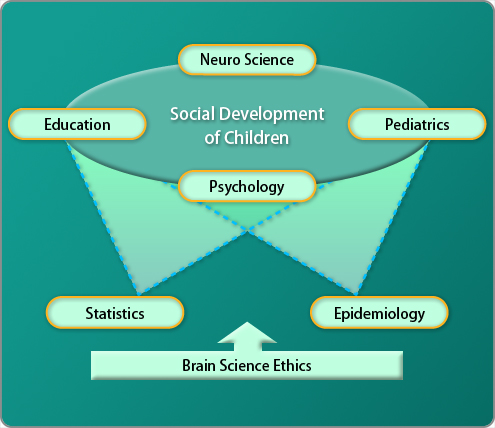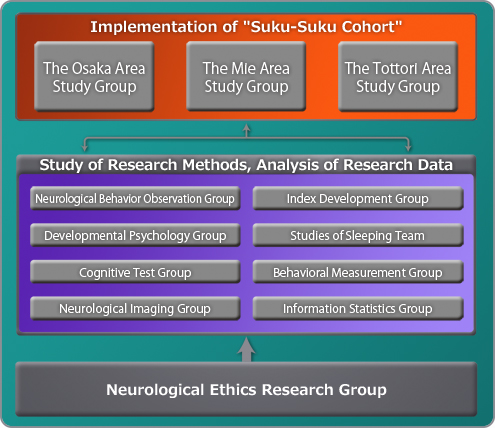|
Research Institute of Science and Technology for Society (RISTEX)
Japan Science and Technology Agency (JST) |
|
R&D Force Area: Brain-Science and Society
"Identification of Factors Affecting Cognitive and Behavioral Development of Children in Japanh
Fiscal year 2004~2008
Also known as: Japan Childrenfs Study (JCS) gSuku-Suku Cohorth
(including gSuku-Suku Cohort Mieh and gMukogawa Child Studyh )
|
gSuku-Suku Cohorth is a national prospective cohort study launched in an attempt to understand the mechanism underlying childrenfs social development. This project has gained considerable attention as the worldfs first prospective cohort study, integrating brain science, medical science, psychology, education, epidemiology, and statistics in the developmental change processes of childrenfs social development. Sociability include the ability to gunderstand the feelings of othersh, gtake the perspective of othersh, and glead a successful social life by being able to effectively communicate with othersh. All children show individual variation in the timing and forms in which such development take shape. With the arrival of the 21st century, bringing about the rapid changes in the social environment of children, including changes in family structure, local community, and increased appearances of various media, the project attempts to reveal the influence such marked social changes have on childrenfs development, utilizing scientific methodologies from pediatrics, neuroscience, psychology, education, epidemiology, and statistics.
The methodology utilized for this project involves a longitudinal observation tracing the course and progress of individual development through time. Time and efforts are needed in implementation of cohort study, where methodology requires taking a long follow-up time, tracing the development of participants from their birth, and generating useful information. Therefore, it requires long-term cooperation of participants, supports of government and related organizations, setting up observation room, and maintaining staffs to provide the sufficient research environment. Through the preparation to launch the project, concerning interdisciplinary academic issues also occurs as follow, (1) conducting a scientifically relevant research (2) developing an original research approach.
In order to turn childrenfs social development into a science, ways to measure sociability and to come up with objective observation method that will produce proper evidence become an important issue. As matters now stand, there is no standard method for measuring childrenfs sociability. Therefore, discussions and decisions concerning methodological approach were made where sociability should be measured from various dimensions using multiple measures, over the use of a single measure, basing the childfs level of social development utilizing the combined scores. The project measures sociability from multiple dimensions of 1. individuality, 2. responsiveness, 3. empathy, 4. control of emotions, 5. motion control, and 6. concerned behavior, examined through combining the results collected from developmental scales, cognitive behavioral scales, social developmental scales, and doctorfs observation. Moreover, questionnaire is composed of various fields of questions especially to measure the environmental factors influencing on childrenfs social development. Observations were undertaken in various areas with Osaka and Mie examining participants at ages of 4 months, 9 months, 18 months, 30 months, while data of participants at ages of 5 years, 6 years, and 7 years are collected in Tottori.
Uncovering the mechanism of changes underlying the individual differences in childfs social development through interdisciplinary examinations using multiple dimensional observation methods is what this project is distinguished from others. With the main objective of the project offering the proposal of a child care environment that will enable each child to reach their full potential, gSuku-Suku Cohorth will enable the collection of a vast amount of data useful for policy making in bettering the current child care environment. Findings from the project will not only enlighten current understanding of childrenfs social developmental processes, it will also enable the retrospective analysis of observed items using statistical models, revealing the causal relationship of factors underlying the variability in the social development of children.
The original plan for the project was to expand the 3 year fundamental research into a larger scaled cohort project. However, the interim evaluation report showed the project needed examining further research methods and implementation, and the project was brought to a conclusion in March, 2009. A JCS committee was established for the purpose of analyzing collected data and publication of findings at the end of fiscal year 2008, which operated for two more years to finalize and conclude the unfinished tasks including creating dataset, analyzing data, and archiving data.
|
|



